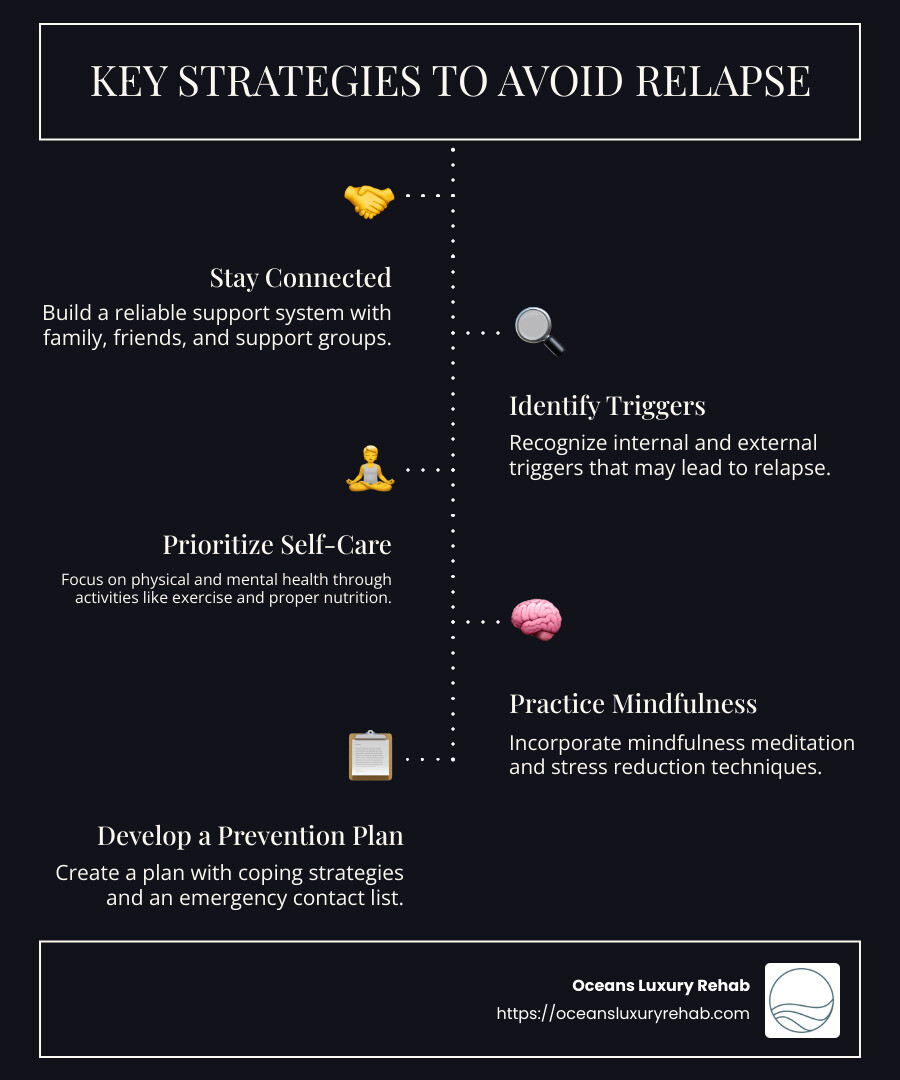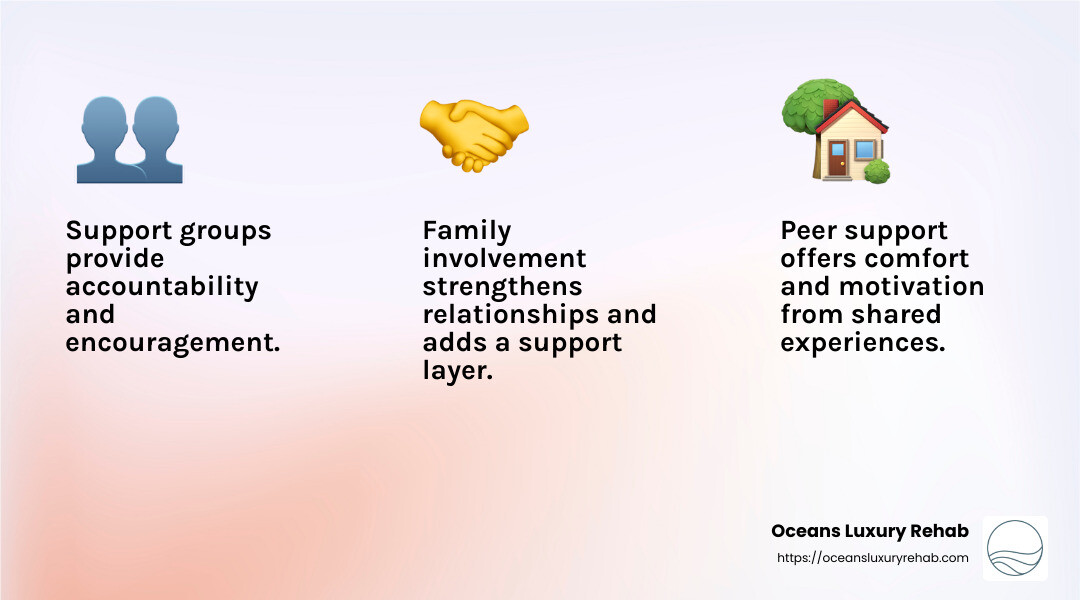How to avoid relapse? This is a pivotal question for anyone on the path to long-term recovery from substance abuse. The journey is challenging but not impossible. To begin, understand these crucial strategies:
- Stay connected with a reliable support system.
- Identify and manage triggers diligently.
- Prioritize self-care and mindfulness.
A relapse is when someone returns to previous levels of substance use after a period of abstinence. It’s a common part of the recovery journey but not an end. Each step through recovery is like climbing a ladder, sometimes requiring a pause or a step back. Preventing relapse is important because it maintains the hard-earned gains in recovery and supports continuous personal growth.
I’m Clint Kreider. With a Master’s degree in Clinical Psychology and years of experience in addiction treatment, I help individuals explore how to avoid relapse? This phrase isn’t just a question but a vital component for those aiming to transform their lives.

How to Avoid Relapse: Key Strategies
Understanding the strategies to avoid relapse can make all the difference in your recovery journey. Let’s explore some key areas:
Understanding Triggers
Triggers can be sneaky. They might be internal, like feelings of stress, anger, or low self-esteem, or external, such as certain people, places, or smells. Understanding these triggers is the first step in managing them.
-
Internal Triggers: These are emotions or thoughts that might lead you back to substance use. Emotional awareness is crucial. Recognize feelings like anxiety or loneliness as they arise.
-
External Triggers: These include environments and social situations that remind you of past substance use. Avoid places or people that might tempt you.

Building a Strong Support System
A robust support system is like having a safety net. It includes friends, family, and support groups who understand your journey and are there to help.
-
Support Groups: Groups like Alcoholics Anonymous provide a community of people who understand what you’re going through. They offer accountability and encouragement.
-
Peer Support: Having peers who share similar experiences can be incredibly comforting and motivating.
-
Family Involvement: Involving family in your recovery can strengthen relationships and provide additional support.

Practicing Self-Care
Self-care is essential. It involves taking care of both your physical and mental health.
-
Physical Health: Regular exercise, a balanced diet, and adequate sleep can improve your overall well-being.
-
Mental Health: Address any co-occurring mental health issues with the help of professionals.
-
HALT: Remember this acronym—Hungry, Angry, Lonely, Tired. These states can increase the risk of relapse, so keep them in check.
Mindfulness and Meditation
Mindfulness helps you stay present and manage stress, which is crucial in recovery.
-
Mindfulness Meditation: This practice increases self-awareness and helps you understand and manage cravings.
-
Self-Awareness: Being aware of your thoughts and feelings without judgment can reduce stress and prevent relapse.
-
Stress Reduction: Techniques like deep breathing and grounding exercises can help you stay calm and focused.
Incorporating these strategies into a structured routine can provide stability and predictability, reducing the risk of relapse. A daily routine that includes self-care, mindfulness, and support activities can be your anchor in the stormy seas of recovery.
Next, we’ll explore how to develop a personalized relapse prevention plan.
Developing a Relapse Prevention Plan
Creating a relapse prevention plan is like building a fortress around your recovery. It involves daily practices and strategies to handle cravings and urges effectively.
How to Avoid Relapse: Daily Practices
Routine: Establishing a structured daily routine can provide a sense of normalcy and control. Incorporate activities that promote physical and mental well-being, like exercise, healthy meals, and adequate sleep. A consistent schedule helps reduce uncertainty and stress, which are often triggers for relapse.
Grounding Techniques: When anxiety or cravings hit, grounding techniques can bring you back to the present moment. Try the 5-4-3-2-1 technique: identify five things you can see, four you can touch, three you can hear, two you can smell, and one you can taste. This method can calm your mind and reduce the urge to use substances.
Deep Breathing: Breathing deeply can help manage stress and emotions. Practice the 4×4 technique: inhale for four seconds, hold for four, and exhale for four. This simple exercise can be done anywhere and provides immediate relaxation.
Handling Cravings and Urges
Play the Tape Through: Before giving in to cravings, imagine the consequences. Visualize what will happen if you use substances versus if you stay sober. This mental exercise can help you make better choices by focusing on long-term benefits over short-term relief.
Distraction Techniques: When cravings hit, distract yourself with activities that engage your mind and body. This could be anything from taking a walk to listening to music or engaging in a hobby. Keeping busy can help shift your focus away from the urge to use.
Delay Tactics: If you feel an intense craving, try delaying the decision to act on it. Tell yourself to wait 10 minutes. Often, the urge will pass or become more manageable during that time.
Coping Strategies: Develop a set of coping strategies custom to your triggers and needs. This might include talking to a friend, writing in a journal, or practicing mindfulness. Having these strategies ready can help you handle difficult moments without resorting to substance use.
Emergency Contact List: Always keep an emergency contact list of supportive friends or family members who understand your situation. When an urge feels overwhelming, reaching out to someone on this list can provide immediate support and remind you of your commitment to recovery.
Monitoring Progress: Regularly check in on your progress. Keep track of your triggers, how you handle them, and any slip-ups. Monitoring helps you stay aware of patterns and make necessary adjustments to your plan.
By incorporating these daily practices and strategies, you can strengthen your defenses against relapse. Next, we’ll discuss how to create a personalized relapse prevention plan that aligns with your unique journey.
Conclusion
Relapse is often seen as a setback, but it’s crucial to understand that it can also be a part of the recovery journey. Relapse doesn’t mean failure; it’s an opportunity to learn and grow stronger in your commitment to sobriety.
When a relapse occurs, it’s important to reflect on what led to it. This understanding can help you adjust your strategies and reinforce your relapse prevention plan. Every slip provides valuable insights that can fortify your path forward.
Learning from setbacks is an essential part of recovery. It teaches resilience and helps you develop more effective coping mechanisms. By analyzing what went wrong, you can identify areas that need more attention and build a stronger foundation for future success.
At Oceans Luxury Rehab, we are here to support you through every stage of your recovery journey. Our compassionate and comprehensive approach ensures that you have the tools and resources needed to steer the challenges of maintaining sobriety. We offer individualized treatment plans that focus on your unique needs, helping you build a robust support system and develop effective strategies to avoid relapse.
We invite you to explore our substance abuse treatment programs and see how we can assist you in achieving long-term recovery success. With our guidance, you can transform setbacks into stepping stones on your path to a healthier, substance-free life.
Recovery is a continuous journey, and every step forward is a victory.
